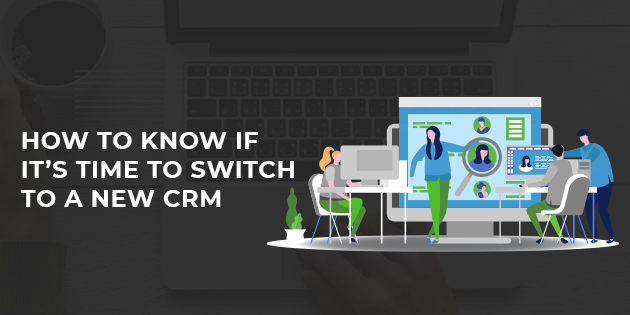Your CRM can be the cornerstone of your business in allowing you to seamlessly keep track of your clients and sales. Even so, they’re not bulletproof. In time, you’ll need to switch from one CRM platform to another.
A capable CRM platform comes with more than a few benefits. At the very least, it’s often more efficient than a VA.
But the most apparent benefit is maintaining an updated registry of your contacts and leads. This makes it easier to keep those leads warm because you never know when they’ll be ready to buy.
To that end, an excellent CRM allows you to stay on top of all client interactions. Looking at the history of the interactions gives you the upper hand in approaching your clients and leads with a more personal or custom offer.
Additionally, it’d be pretty straightforward to notice prospects that haven’t become customers yet. It’s because a CRM will list all the leads that have yet to convert so you can retarget them.
But how do you know if your CRM is no longer up to scratch and it’s time to go shopping for a better solution?
Fortunately, there are a few tell-tale signs. Read on to find out what they are.

Should You Change Your CRM?
1. You Can’t Seamlessly Integrate Your Communication Channels
The goal is to find a CRM that offers quick and easy integration with all other communication channels you might be using. Most CRMs come with email integration, but what if you need to go one step further?
Can your current CRM integrate Slack, social media messages, and other channels?
Assuming these are crucial to your operations, you need a software platform that can work with all of them. That capability will turn your CRM into a hub for all company communications. And the benefits here are multifold.
For one, you have all communication threads in one place and can track the full history. This setup also significantly cuts the time and effort necessary to facilitate active communication between your company and the clients.
Just imagine the nightmare of running a host of apps at the same time just to be able to respond in a timely manner.
A capable CRM software also allows you to automate some of the responses according to the triggers set.
For example, we’d recommend creating an opt-in page that captures lead details and feeds them directly to your CRM. Then, you could automate (at least partially) your sales process. This setup usually happens with automated sales emails.
But the importance of integration doesn’t stop at communication. You are likely using a bunch of marketing and sales tools, which you should integrate into the CRM as well.
The idea is to keep everything in one place and automate most menial tasks so that you have more time to focus on what’s truly important.
Additionally, integrating these tools into your CRM gives you a better overview of the most vital metrics. You minimise the chances of getting duplicate and conflicting data that can give you a false idea about your sales and customer pool.
2. Your CRM Can’t Keep Up with Your Growth
It makes sense to keep everything modest in the startup phase. You might have a small team and a relatively small customer base, which makes running things pretty straightforward.
But things will change as your business grows. This is when you should be using advanced software and tools to stay on top of company operations. Also, you need to know what’s going on across departments.
Unfortunately, the basic CRM that worked well enough in the beginning may not keep pace with what you now need. It might be lacking functionalities like:
- VoIP support – this allows you to call clients directly through the CRM.
- Web form integration – the forms help you attract the best leads and are usually customisable, such as based on a set of templates. But it’s ideal to style the forms in a way that aligns with your company’s branding.
- Interactive dashboard – it shows you the critical metrics. Ideally, there should be a range of dashboards containing in-depth performance analytics.
- Custom script support – scripts are code for improving your workflows or processes per the needs of your business.
Of course, these are just a few examples. The point is to understand why it’s important to use a CRM that can keep up with your business.
To offset missing functionality, some business owners try to create workarounds. But without the same level of functionality as fully-integrated CRM solutions, this is usually a waste of time and resources.
That said, the worst thing is to do nothing and continue using an outdated CRM that can no longer address the needs of your business.
3. You’re Not Sure if Your Data Is Reliable
The sales metrics that you get from your CRM are vital, but they aren’t the only useful data.
Remember, the goal is to keep tabs on the whole sales process. This means logging all marketing and sales activities, including interactions between clients and your teams. These analytics should enable you to make accurate sales projections and growth forecasts.
At the very least, your CRM should include an easy to use forecasting tool to prevent you from having to spend hours making sense of data and projections.
A good CRM won’t leave you guessing as to whether your teams have the most relevant data. It should provide timely forecasts for the entire sales pipeline, both long- and short-term.
Additionally, its forecasting tool or dashboard should have fields for status, probability, and volume. These are metrics that can help you make more accurate predictions based on your current performance and growth potential.
But what happens if a CRM can’t provide accurate data?
Unreliable data can prevent your staff from making accurate business decisions. And as the leader, you may be in the dark about the company’s projected profitability as a result.
Experienced salespeople may even recognise an underperforming CRM and be reluctant to use it. That’s why you may want to solicit your teams’ feedback when selecting a new CRM.
4. You Can’t Keep Your Team Up-to-Date
Some CRMs offer a rigid deployment plan, which could mean a few things.
Often, it may make it hard to add new users or remove old ones without losing important data. And if you try to tweak the deployment plan, you’ll be compromising workflows and productivity. More alarmingly, your teams won’t be able to use the functionalities specific to their tasks and operations.
The fact is that CRMs can’t update employees properly when there’s a problem with the technology itself.
You should be able to access the CRM on various devices, mobile included, so you can update the workflow on the go. A good example here are businesses that have field sales teams. Coordination between teams is vital, so they must be able to update and access the CRM whenever and wherever.
It’s also become crucial for CRMs to work within the cloud environment. So when working remotely, any team member can log into the cloud database and make changes in real-time. This makes it easy for everyone in the company to have access to the most updated version.
A cloud-based CRM is particularly handy if your company plans to set up an international branch. The fact that all the updates happen in real-time allows for a much smoother and efficient workflow.
5. There Are Many Features that You Don’t Use
Many people go by the assumption that a great CRM must be loaded with features. But the reality is, more isn’t necessarily better.
If a CRM has lots of features that your teams won’t be using, it might complicate even the simplest of tasks for your people.
Recently, Apptivo conducted a study and found that software complexity is the primary reason that compelled businesses to switch to another CRM.
How do you avoid making the same mistake?
As mentioned, talk to your team and work together to pick the most suitable CRM solution. Generally, you want a CRM with multiple user plans and features that enable your teams to perform tasks quickly and efficiently.
The salespeople get access to advanced sales tools and functions. Meanwhile, the customer service department can address client needs faster and provide more comprehensive feedback. Similarly, your marketing team can rely on CRM to analyse previous campaigns and formulate new ones.
What’s more, CRMs with different levels of plans are usually scalable. As your company grows, you should be able to change or add functions based on your teams’ needs. Therefore, it’s also essential to find a CRM vendor that offers great customer support.
6. The CRM’s UX And UI are Complicated
Since the goal is to be able to access all data, analytics, and reporting easily, you need a user-friendly CRM that can facilitate a more streamlined workflow.
A recent survey found that close to 90% of CRM users credit user-friendliness as a deciding factor when selecting a new CRM. Aside from more efficient workflows, a user-friendly CRM is likely easier to learn, so your teams can get up to speed quicker.
If that’s not the case with your current CRM, it may be time to look for a new one that has everything logically laid out. Your team members shouldn’t have to waste time trying to decipher things or find their way around the UI.

Get Ready for the Switch
Despite the challenges, it’s good news enough that you’re considering a switch. It shows that your company has outgrown the old system’s capabilities.
But the transition to a potent new CRM is always complex and will take time for everybody to learn the ropes. This is why it’s crucial to have a sit-down with your teams and determine the key points of improvement before pushing forward.
Overall, your goal is to find a flexible and scalable CRM that offers all the necessary functionalities from the start. You want a CRM that can grow with your company, one that won’t jeopardise your processes or workflows when you make adjustments to the system.
We understand that the transition might appear overwhelming, but you don’t have to go through it alone.
Our Concierge Service is there to gather all the loose ends and execute a smooth switch-over. Follow this link to get a better understanding of how Automation Agency can help.


